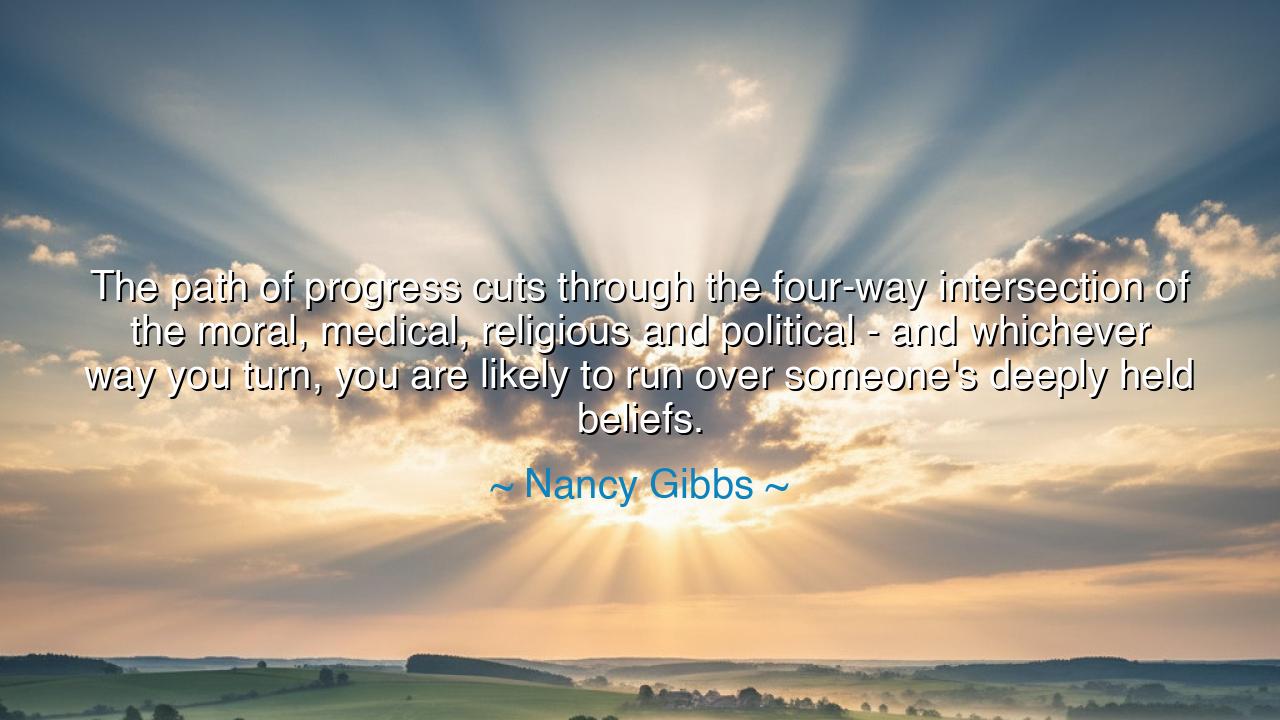
The path of progress cuts through the four-way intersection of
The path of progress cuts through the four-way intersection of the moral, medical, religious and political - and whichever way you turn, you are likely to run over someone's deeply held beliefs.






The words of Nancy Gibbs are as a torch held high to illuminate the struggles of humankind’s journey: “The path of progress cuts through the four-way intersection of the moral, medical, religious and political—and whichever way you turn, you are likely to run over someone’s deeply held beliefs.” In this utterance lies both hope and warning. Hope, because the path of progress moves forward—it is not stagnant, it is alive, it is ever-striving. Warning, because every step forward risks shaking the foundations of another’s world. Progress is not a gentle stream, but a river cutting through stone, reshaping the landscape, leaving beauty and scars alike in its wake.
The ancients knew this truth well. Consider the philosophers of Athens, who challenged their city’s traditions with questions of justice, knowledge, and virtue. Socrates himself walked boldly upon the road of inquiry, yet for his progress he was condemned, for his questions struck against the deeply held religious and political beliefs of his time. His death became the testament that progress and reverence often clash, and that those who carry new truths must walk prepared for resistance.
The moral realm, too, resists the force of progress. When medicine first sought to understand the body, to dissect, to explore its mysteries, many cried out in outrage, for they saw in such acts a violation of sacred law. When politics sought to break chains and abolish slavery, others resisted, bound by traditions they mistook for eternal truths. In every age, the medical, the political, and the religious have stood as both guardians of order and obstacles to change. Thus, Gibbs’ words remind us that progress does not advance unchallenged; it advances through struggle, conflict, and the shaking of beliefs long held as immovable.
A powerful example can be seen in the story of Galileo Galilei, who looked to the heavens and proclaimed that the Earth was not the center of the universe. With his telescope he unveiled truths that shattered the religious certainty of his day. Yet his discovery also touched the political, for the church’s authority was bound tightly to its teachings, and the moral, for to question the place of man in creation was to stir the deepest fears of insignificance. Galileo’s progress was light, but it scorched as well as it shone. He was forced to recant, but his truth endured, showing that though progress may trample beliefs, it cannot be forever silenced.
From this we must learn: progress is a double-edged sword. To move forward is to disturb; to create is to unsettle; to heal one wound is sometimes to expose another. Yet this is the destiny of humankind. If we halted out of fear of offense, we would remain forever bound in chains of ignorance. The path is perilous, yes, but it is also glorious. For even as it shakes beliefs, progress has the power to heal, to liberate, to bring justice and knowledge where once there was darkness.
And so, children of the future, take heed: when you walk upon the path of progress, walk with courage, but also with humility. Do not rush forth as one who tramples without care, but as one who knows that the beliefs of others are sacred to them, even when they seem mistaken. Speak with truth, but temper it with compassion. Create change, but listen with respect to those who fear it. For though you may not avoid all conflict, you may soften its blow with wisdom.
In practice, let each of you consider this: when you champion a cause, ask not only how it uplifts, but also whom it unsettles, and why. When you hold to your own convictions, ask if you have given space to hear the convictions of others. Progress must be pursued, but if pursued without empathy, it becomes a sword of division rather than a bridge of light.
Thus, Nancy Gibbs gives us a vision both sobering and empowering. The road of progress will always pass through the crossroads of moral, medical, religious, and political forces, and there will always be cries of resistance. But the true traveler is not deterred. They march on, not with arrogance, but with courage and compassion, knowing that though their steps may wound, they may also heal—and in the balance of these two, the world moves forward.






AAdministratorAdministrator
Welcome, honored guests. Please leave a comment, we will respond soon